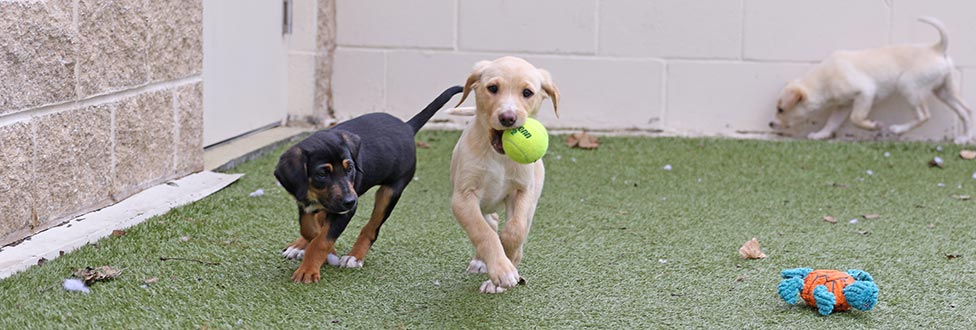Is Your Dog Socializing During the Pandemic? Yes!
Socialization. So important for our pets, however during this time of social distancing and being at home more, many pet owners, particularly new pet owners, have reached out to the Animal Rescue League of Boston (ARL) with questions about socialization.
However, we first need to understand what exactly what socialization is.
When many of think of socialization for our pets, we may think of interacting with humans and other animals – but in fact, socialization is so much more than that.
Socialization begins at a very young age. For about the first year of life, the fear instinct in dogs is practically non-existent, which is a wide open window for new experiences.
During this time, we expose them to what’s considered normal in our everyday lives including: being outside, wearing a leash and collar, meeting but also seeing men, women, children, and other domestic animals. Even exposure to cars, a crate, bicycles, umbrellas, canes – all these things can be deemed as socialization.
With that being said – it’s extremely important that we expose our new puppies or adult dogs to as many new things as possible — and to pair those experiences with delicious food so they forever build a positive association to the new things that will eventually be normal to them.
But what about are current impacts to our everyday lives?
Regardless of the pandemic, your new puppy (or even new adult pet) is being exposed to new things every minute they are awake, so if you’re concerned about your pet being behind in the socialization department – don’t worry because they’re not!
And as we slowly begin to venture back into the outside world, whether it’s a beach, dog park, or Boston Common, you’ll want to take it slow for your pup, never let them off leash, and of course follow social distancing guidelines.
However, even despite staying six feet from others, we can still expose our furry friends to the world around them.
They can see unfamiliar people at a distance, hear unfamiliar noises, and also see other dogs from far away. Again, you want to pair these new “social” experiences with special treats so your pup will have a positive connection and become a well-adjusted member of the family.
ARL’s Pet Behavior Helpline
Pets have amazing, individual personalities, and if you get to a point where your pet’s behavior is becoming a concern, the Animal Rescue League of Boston offers a FREE behavior helpline to answer questions about dogs, cats, and small animals. For assistance, call (617) 226-5666, or email behaviorhelpline@arlboston.org.

